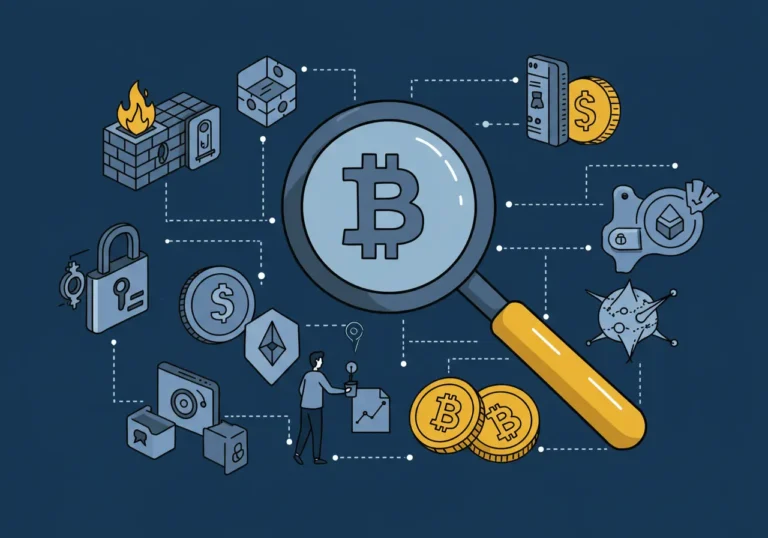Crypto Anonymity: Protecting Your Identity on the Blockchain
Hey guys, I hope you’re all well, let’s get straight to the point. Crypto Anonymity means keeping your real identity separate from the addresses and transactions you use on a blockchain. It is about privacy, safety, and making choices that lower the chance someone can match your name to your coins. If you want to keep your crypto activity private, there are sensible steps you can take.
Why privacy matters on blockchains

Blockchains like Bitcoin and Ethereum are public ledgers. Every transaction is recorded and can be read by anyone. That transparency is useful. It helps people trust the system. But it also means that a determined person can trace funds, identify patterns, and sometimes connect an address to a real person.
People want privacy for many reasons:
- They don’t want their financial life on display.
- They want to avoid targeted scams.
- They may be journalists, activists, small business owners, or simply private people.
- They want to reduce the chance of theft, extortion, or unwanted attention.
Protecting your identity is not about breaking rules. It is about staying safe and in control.
The simple truth about addresses and identity
Every wallet address is like a public mailbox. Anyone can see what goes in and out. If your address is linked to an exchange account, an online profile, or a store that knows who you are, that link can reveal your identity. Once that link exists, other addresses you use can be traced back to you.
So the first lesson is clear and simple: treat addresses as public. Plan for that. Use different addresses for different purposes. Keep your personal details out of places that publish your address.
Practical, everyday steps to protect your privacy
Here are realistic steps you can start using today.
Use separate wallets for different activities
If you use crypto for savings, trading, and donations, consider separate wallets. One for long-term holding. One for daily spending. One for a public tip jar. This reduces the chance that an observer will connect all your activity in one place.
Avoid reusing addresses
Many wallets make a new address for each transaction. Use that feature. Reusing the same address is like using the same mailbox for every store you visit; it makes it easy to see your whole history.
Be careful with exchanges and KYC services
When you exchange fiat for crypto, most trustworthy services require identity checks (KYC). Those services often link your name to addresses. Know this and plan accordingly. If privacy is a priority, consider how you move funds after the exchange, and read the service’s privacy policy.
Use hardware wallets for safety
Hardware wallets keep your private keys offline. They protect you from hackers and phishing. While they do not make your transactions anonymous, they add another layer of security to protect your identity and funds.
Consider privacy-centered wallets and features
Some wallets offer built-in privacy features like address management or coin-mixing integrations at a high level. These wallets may also help you avoid address reuse and warn you when an address you interact with is linked to known services.
Think about network-level privacy
When you connect to exchanges or wallets, your internet connection reveals your IP address. Using privacy tools such as VPNs or the Tor network can hide your IP. But be careful: these tools are legal in many places, and they add privacy at the network level. If you choose to use them, do so with awareness of the law where you live and the policies of services you use.
Keep personal details off-chain
Don’t post your wallet address on public social media linked to your name. Don’t sign messages or transactions that include personal information. Treat blockchain data like public glass: anything written could be read by anyone.
Privacy tools and what they do — without the technical deep dive
There are several tools people use to increase privacy. I’ll describe them without giving step-by-step instructions for anything that could be misused.
Privacy coins
Some cryptocurrencies focus on privacy by design. They make it hard for outsiders to trace transactions. These coins are used legitimately by people who need stronger privacy. They are also watched more closely by regulators in some places, so there may be additional compliance or legal considerations.
Coin mixing and aggregation services
These services combine many people’s funds to obscure transaction history. In some places they are legal, in others they are restricted or monitored. They can add privacy but also carry legal and trust risks. Avoid services that require you to trust an unknown operator with your funds.
CoinJoin and similar protocols
CoinJoin-style methods let multiple people create a single combined transaction, making it harder to tell who paid whom. Some wallets offer CoinJoin as a feature. These techniques are a way to use the network’s rules to improve privacy without handing your funds to a third party.
Layer 2s and off-chain transactions
Some solutions let people transact off the main blockchain. These can reduce the amount of on-chain history visible to others. They are often faster and cheaper, and they can reduce exposure of your on-chain footprint.
Legal and ethical considerations
Privacy tools can be used for good and for harm. Laws vary by country. Using privacy tools does not remove legal responsibility. If you are a journalist, activist, or a normal user with privacy concerns, seek legal advice in your jurisdiction. If you want to keep your money and personal life private, do it within the law.
Always avoid anything that helps hide criminal activity. Privacy is a human right in many contexts, but it does not protect illegal actions.
Habits that protect you more than special tools
Some simple habits often do more than any single tool:
- Use strong, unique passwords and a password manager.
- Enable two-factor authentication (but prefer authenticator apps over SMS).
- Keep personal and business addresses separate.
- Do regular checks on your public addresses to see if any information links them to you.
- Be cautious with links and QR codes. Scammers often use them to trick people.
- Think before you post: linking a public wallet to an identity is permanent.
When to get help from professionals
If you manage large sums or run a business, talk to a security or privacy professional. They can design a tailored plan. If you are a journalist or activist facing real threats, privacy experts can help with threat modeling and secure workflows.
Mistakes people commonly make
- Linking a public address to their real name on social media.
- Assuming privacy is built into all cryptocurrencies.
- Using SMS-based two-factor authentication as the only extra lock.
- Trusting unknown services with private keys or seed phrases.
- Ignoring laws or failing to consider legal obligations when using privacy tools.
The balance: privacy vs. transparency
Blockchain’s transparency is a strength. It fights fraud and helps build trust. Privacy is also a right and a safety measure. Good solutions balance both. Think about what you need: privacy for daily life, or full anonymity for sensitive work? Your choices will vary.
Final thoughts: small steps, big difference
Protecting your identity on the blockchain does not require becoming a tech wizard. Start with basic habits: separate wallets, avoid address reuse, secure your devices, and be mindful of where you link your crypto activities. Learn a little more before trying advanced tools. Privacy grows when you make steady, sensible decisions.
Crypto privacy is about care. It is about respecting your own safety and the safety of others. Make choices that fit your life and local rules. A bit of planning today can protect you from worry tomorrow.
Summary
- Crypto Anonymity means keeping your name separate from your blockchain addresses.
- Treat addresses as public; avoid linking them to your real identity.
- Use separate wallets for different purposes and avoid address reuse.
- Hardware wallets, privacy-focused wallets, and network privacy tools add protection.
- Be cautious with mixers and privacy services; consider legal risks.
- Strong passwords, authenticator apps, and careful posting habits help a lot.
- For large holdings or serious threats, consult a privacy professional.
FAQ
Q: Is crypto really anonymous?
A: Most public blockchains are pseudonymous, not anonymous. Addresses are public but don’t show a name unless you link them to one. That link often comes from exchanges, profiles, or public posts.
Q: Can I be fully anonymous with crypto?
A: Some tools and coins increase anonymity, but full anonymity is hard and may carry legal and ethical concerns. Focus on privacy that fits your needs and follows the law.
Q: Are privacy tools illegal?
A: Not usually. Laws differ by country. Some services or actions may be restricted. Always check local regulations and use privacy tools responsibly.
Q: If I use a VPN or Tor, am I safe?
A: Network tools hide your IP address but don’t protect your seed phrase or on-chain address links. Use them alongside good wallet practices and secure keys.
Q: What is the single best habit to improve privacy?
A: Avoid posting any wallet address connected to your name. Treat addresses as public and separate personal identity from blockchain use.
Table of Contents

Hello, I’m Edmilson Dias, founder of CoinBringer. I created this platform to guide people through the fast-moving world of cryptocurrency with clarity and safety. With years of research in blockchain and digital security, my goal is to translate complex topics into practical knowledge, offering reliable tutorials, safety insights, and guidance for both newcomers and experienced users.
Discover more from CoinBringer
Subscribe to get the latest posts sent to your email.







